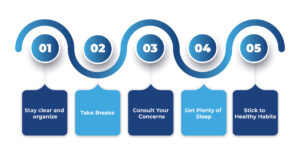Many kids fear school because they have too many assignments and are expected to perform well. Dealing with constant stress in school can produce physical results such as headaches, trouble sleeping and lower resistance to diseases. Similarly, emotional effects can include less confidence, a short temper and possibly depression.
Moreover, if school stress is not managed, it can affect how students do in school and feel in general. So, families and teachers need to recognize these symptoms on time and offer proper support. There are effective strategies to handle stress and problems such as anxiety and ADHD, which you may receive by reaching out to MAVA Behavioral Health.
Is School Stress Normal?
Yes, it is because a lot of students deal with stress in school at certain times. Overworking with homework or exams, seeing friends act a certain way, and trying to manage school with other responsibilities are some reasons. It suggests that you care about your future if doing well in school gives you anxiety.
In addition, excess stress for an extended time can harm you. It can result in sleep troubles, head pains, or feelings of sadness or anger. If you take breaks, rest well, and do enjoyable things, school stress will become more manageable.
School Stress Symptoms
Here are the common signs of school stress:
- Pain in the head or bloating.
- Inability to sleep or constant tiredness
- Mood swings or irritation
- Lack of interest in schoolwork or interests
- Difficulty focusing and remembering things
- Changes in food habits (eating too much or not enough)
- Skipping classes or certain classes.
- Crying frequently or feeling hopeless.
Causes of Stress in Students
There are the following causes that might cause the students to stress out:
Pressure to achieve excellent marks.
- Pressure to achieve excellent marks.
- Too much homework or studying.
- Upcoming tests or examinations.
- Fear of failing and disappointing people.
- Bullying or peer pressure.
- Inadequate sleep or inadequate time management.
- Family difficulties or expectations.
- Balancing school and recreational activities.
How To Manage School Stress?

1. Stay clear and organize
When you are organized, you can manage your school work more easily, which reduces stress. Keep a planner to stay on top of your homework, tests, and deadlines. Separate a big job into smaller duties to tackle them early and not wait until it’s urgent. If you keep your desk and area tidy, you might concentrate more. Discovering the actions needed gives you a sense of control.
2. Take Breaks
Studying all the time and not taking breaks may make you exhausted. Having a short break between study sessions allows your brain to rest. During your break, stand up and stretch, move, or do something you like to do. It helps you relax and concentrate better after you get back. Getting enough rest as well as studying is necessary for achieving success.
3. Consult Your Concerns
Telling a person you trust how you feel can help alleviate some of your stress. Having a conversation with a parent, teacher, or friend helps you feel confident in yourself. You don’t have to face stress alone. Stay focused and attentive to your concerns.
4. Get Plenty of Sleep
Sleep allows your body and brain to work efficiently. Lacking sufficient rest, it is difficult to pay attention, recall things, or remain tranquil. Try to get 7–9 hours of sleep every night. Keep your bedtime the same during weekends, whenever possible. Having a good sleep routine helps you do better and feel less stressed.
5. Stick to Healthy Habits
Healthy eating, appropriate water, and regular physical activity can all help to reduce stress. Even a tiny bit of exercise can help your brain release stress hormones. Good health is achieved by leading a healthy lifestyle that benefits both your body and mind.
Role of Parents in Stress Management in a Child
Parents and caregivers can greatly support children in stress management for students. Listening with patience and love helps children feel secure and known. Sharing a short talk with children about how their day went, what they did in school, and their feelings may assist them in talking about their worries. Parents might observe stress in their child, such as if the child’s mood or sleeping changes, and can nicely ask if something is on their child’s mind.
Furthermore, caregivers are able to make the home environment calmer and more organized. When meals, homework, and bedtimes happen regularly, children are more secure about their lives. Practicing exercise, proper sleeping and regular breaks are good for reducing stress. Most importantly, children learn from their parents’ calm and positive examples of how to manage stress. Hence, families can handle difficulties together in a kind and supportive way.
School Stress Examples
Stress in school students can happen in several ways, influencing students in school, with other people, and emotionally. Here are some well-known cases.
- Additional school assignments, approaching tests, and strict deadlines could lead to stress.
- Experiencing stress and anger can happen because there are too many assignments.
- Not getting enough sleep may make it harder to focus and do well in school.
- Putting things off late can lead to being very busy just before the exam.
- When under stress, kids might skip school regularly and not do well in their classes.
5 Tips for Dealing with School Stress
1. Stay Calm
When you stay calm under stress, it becomes easier to think logically and choose the best option. Work on not letting setbacks create too much stress. Calming yourself helps to keep stress from reaching anxiety levels. Being calm-minded helps people handle emotions better and feel better.
2. Prioritize Self-Care
A well-balanced diet, proper sleep, and exercise are necessary for good mental health. Not paying attention to these can cause more stress and result in poor academic performance. Having breaks to read or listen to music helps you feel refreshed. Self-care is something you cannot do without long-term success. Having good physical health usually leads to clearer thinking.
3. Practice Time Management
Schedule your study sessions and brief breaks for more discipline. Planning gives you time to complete tasks by the deadline. Spending enough time on schoolwork and enough downtime helps you avoid getting burned out. Effective time management allows you to feel very confident in handling all your tasks.
4. Seek Support
When you feel too stressed, talk to a teacher, a counselor or a friend. Talking about your problems can improve your mood and give you useful advice. You may request more time or some assistance from your instructors or peers when needed. A good support system helps us avoid feeling all alone. Other people want to help you navigate your mental health.
5. Maintain a Positive Mindset
Individuals should challenge themselves by thinking of challenges as chances to learn more and get better. Try to eliminate negative self-talk and be happy about your little steps. Recognize that stress has a finite timeframe and is not impossible to handle. Showing appreciation or staying mindful can help you stay consistent. Giving yourself a positive attitude can help you cope with any tough time.
End Note
If parents can help reduce stress in their children, it will support the kids’ growth socially and academically. Teachers and parents must cooperate closely to notice early signs of stress and address them by talking openly. A caring atmosphere at home and in school helps lessen the stress children deal with.
Ultimately, if the issues are more serious, such as chronic stress or conditions such as ADHD, getting professional help is important. At MAVA Behavioral Health, you can receive treatment for stress, ADHD, and similar issues affecting children. Our staff provides personal treatment, helping each child develop mentally, emotionally, and socially with support.
FAQs
What is the main cause of stress in school?
Most of the stress students face in school comes from the difficulty of tests, the number of assignments, and the pressure to perform well. Extra pressure is often added by rivaling with peers and having high standards set by parents. Facing difficulties in social interactions, such as bullying or managing extra activities, can play a major role.
How do you cope with school-related stress?
To overcome school stress, make sure you plan your time and break your work into short and achievable segments. You can restore balance by doing relaxing things, getting plenty of sleep, and looking after your well-being.
How to deal with school stress and anxiety?
To cope with school stress and anxiety, try staying focused and calm with mindfulness or slow breathing. Having a schedule for reviews and sticking to a good routine helps build your trust in yourself. Revealing what bothers you to a trusted adult is a good way to reduce emotional stress.
How does school stress affect physical health?
Headaches, problems sleeping, and lack of energy may be signs of school stress that disrupt normal daily activities. After a while, it may decrease the strength of your immune system and you become more likely to catch illnesses.









